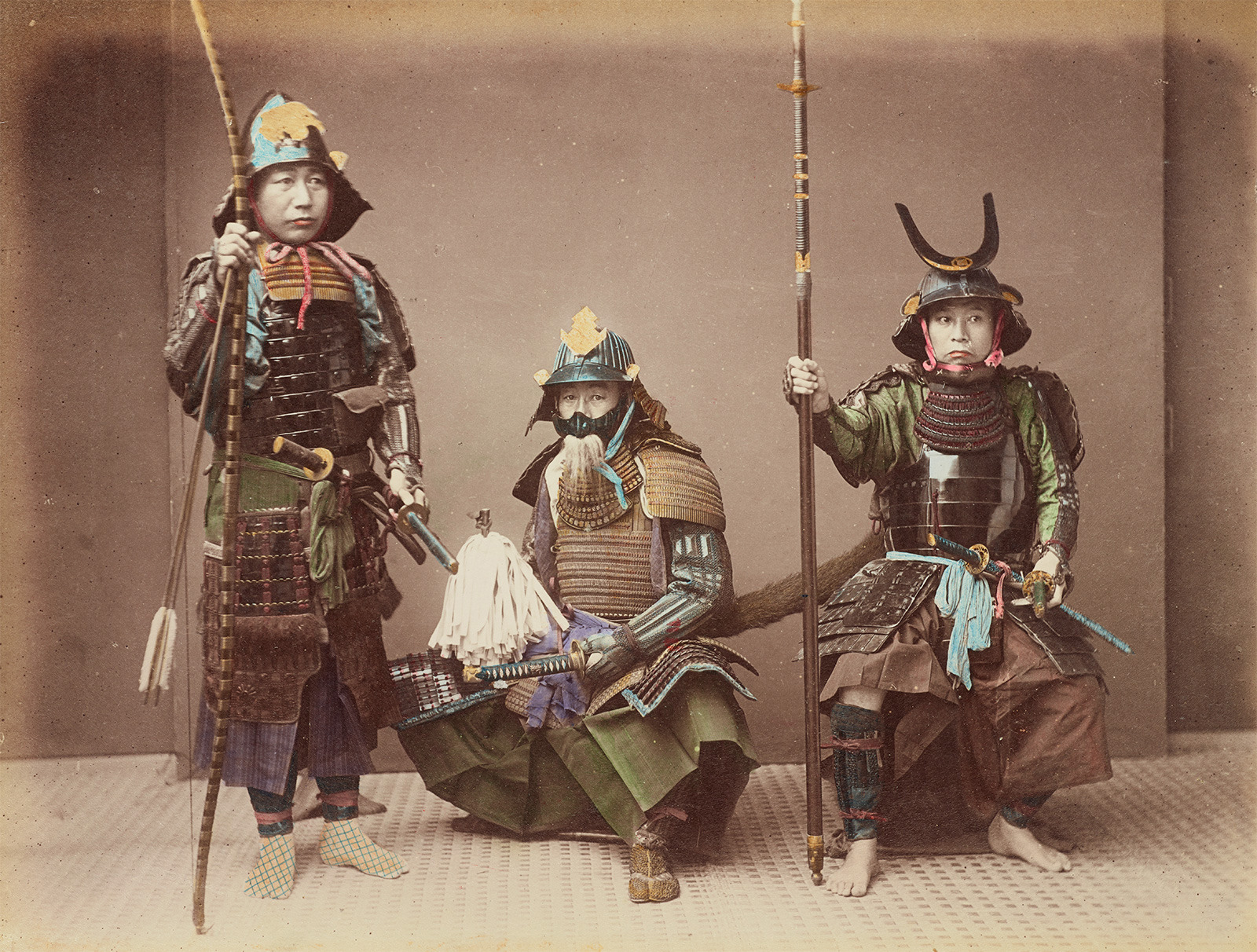Samurai in Armour, hand-colored albumen silver print by Kusakabe Kimbei. 1860s. J. Paul Getty Museum (object no. 84.XA.700.4.58), digital image courtesy of the Getty’s Open Content Program.
Bushido, the code of conduct for the Samurai class in Japan, has a rich and complex history that spans several centuries. Its principles and practices have evolved over time, influenced by various philosophical and religious traditions.
The origins of Bushido can be traced back to the Heian Period (794-1185), when the Samurai served as armed supporters of wealthy landowners. The term “Samurai” roughly translates to “those who serve,” reflecting their role as loyal servants to the Daimyos, or great lords.
The idea of the Bushido code began to take shape during the Kamakura period (1192–1333), a time when the Minamoto family established Japan’s first military government, the Bakufu. The practice of Seppuku (ritual disembowelment) also emerged during this period.
Influence of Zen Buddhism and Confucianism
The content of the Bushido code varied historically as the Samurai class came under the influence of Zen Buddhist and Confucian thought. Zen Buddhism’s austere rituals and belief in salvation from within provided an ideal philosophical background for the Samurai’s code of behavior.
Confucian ethics also played a significant role, particularly during the Edo (Tokugawa) period (1603–1867), when Bushido thought was infused with Confucian ethics and made into a comprehensive system that stressed obligation or duty. The Samurai was equated with the Confucian “perfect gentleman” and was taught that his essential function was to exemplify virtue to the lower classes.
Modern Era and Beyond
In the mid-19th century, the precepts of Bushido were made the basis of ethical training for the whole society, with the emperor replacing the feudal lord, or Daimyo, as the focus of loyalty and sacrifice. This shift contributed to the rise of Japanese nationalism following the Meiji Restoration (1868) and to the strengthening of civilian morale during the Sino-Japanese War (1937–45) and World War II.
Instruction in the code was officially abandoned with Japan’s defeat in 1945. However, elements of the code remain in the practice of Japanese martial arts and in the sport of sumo wrestling. Today, the traditional Samurai code of honor, discipline, and morality known as Bushido–or “the way of the warrior”–continues to influence much of Japanese society.

Key Principles
The number of principles in the Bushido code can vary depending on the source. Some sources mention seven core principles, while others refer to eight key principles or virtues. These principles served as a moral compass for the Samurai, shaping their actions, behavior, and way of life.
1. Righteousness (義, Gi)
Righteousness, sometimes referred to as justice, is about striving to do what is right. It extends beyond interactions with others and also encompasses maintaining integrity even when no one is watching.
2. Courage (勇, Yu)
Courage in the Bushido code is not just about bravery in the face of death or combat. It is about facing life as a whole with the confidence necessary to overcome challenges and realize happiness.
3. Benevolence (仁, Jin)
Benevolence in the Bushido code is about understanding the pain of others and desiring to help in any way possible. It is about using one’s power for the greater good.
4. Respect (礼, Rei)
Respect in the Bushido code is about knowing when and how to use power wisely. It involves understanding our own place, the desires and wishes of others, and how our actions affect those around us.
5. Honesty (誠, Makoto)
Honesty in the Bushido code is about being truthful in all dealings. It is about being genuine and authentic in one’s actions and words.
6. Honor (名誉, Meiyo)
Honor in the Bushido code is about living a life that is worthy of respect and admiration. It is about upholding the dignity of the Samurai name and living in a way that brings honor to oneself and one’s family.
7. Loyalty (忠義, Chugi)
Loyalty in the Bushido code is about unwavering allegiance to one’s master or lord. It is about being faithful and devoted, even in the face of adversity.
8. Self-Control (自制, Jisei)
The eighth principle of Bushido is Self-Control. This principle is about mastering one’s emotions and desires. It emphasizes being disciplined and focused, and not giving in to impulsiveness or recklessness. It also encourages mindfulness and awareness of our thoughts and actions.
These principles formed the core of Samurai ethics and set them apart as warriors of integrity and honor. The Samurai’s commitment to these virtues made them not just warriors, but also role models in their society.
Final Thoughts.
The Bushido code continues to inspire millions around the world today. Its principles, though rooted in ancient warrior traditions, still hold relevance in modern times, guiding individuals to live balanced, principled, and honorable lives.
*The views and opinions expressed on this website are solely those of the original authors and contributors. These views and opinions do not necessarily represent those of Spotter Up Magazine, the administrative staff, and/or any/all contributors to this site.
